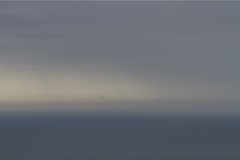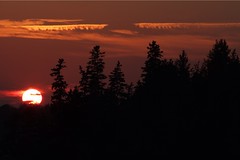
Friday night has become Saturday morning and the frat boys and sorority girls who have flowered into young urban professionals fill Lincoln Avenue like a throbbing cloud of jellyfish. A multitude of faces under yellow lights: smiling, laughing, crying, shouting, vacant. Strong shadows play havoc with expressions, eyes glimmer in too-dark sockets, noses are accentuated, double-chins erased. Pulsing bass grooves undulate through brownstone walls while their treble counterparts flow through open doors, present one moment, absent the next.
On the west side of the street, in front of a hospital for children, a group of men in pale striped shirts is getting harassed by an aspiring boxer with a wife-beater and cornrows. The aspiring boxer prances stupidly from one foot to the next, facing the group as he hops backwards down the street. He swings his arms in wide, flailing arcs towards one of the men, hands open, pawing and fondling the shirt sleeves of his seething opponent. The group stops. The boxer stops in front of them. Angry words are exchanged. The boxer takes another provocative slap. Men in the group straighten their shirts and roll their necks, elaborately preparing for a fight as if Hollywood cameras were trained on them.
On the east side of the street, taxis jockey for fares in a huge, self-defeating automotive snarl. They clog up a six-way intersection and the traffic lights cycle impotently through colors as cars back up further and further. Horns add their shrill voices to the cacophony of human noises as emaciated hipsters dart between cars on their bicycles. Schools of pedestrians follow suit, abruptly wriggling from one side of the intersection to another, swimming against the current of taxis.
The girl in the electric blue dress isn't tall, but she is beautiful. Athletic, blonde, perfectly proportioned, hers is the kind of beauty that makes traffic tickets vanish, job opportunities materialize, and bartenders prompt and attentive—which seems to have been the story tonight. For some reason, she is alone and, perhaps for the same reason, she is completely and totally drunk. Her perfect teeth are exposed by a gently-moronic grin and her bleary eyes are fixed directly in front of her, across the street. Inspired or terrified by all of the noise and activity, she migrates and her excessive stilettos click unevenly on the cool pavement. Click, click, click. One frozen aisle of cabs and then another, she crosses perpendicular to the green, head locked forward, eyes fixed, smile still idiotic. What does she see on the far sidewalk? Not the taxi. The only taxi in motion. The taxi that has, finally, discovered a clear channel through the gridlock and is flying forward at twenty miles per hour. And the taxi doesn't see her, either, as she totters out from between two frozen cars into its path. Her beauty is irrelevant.
And there is a sound like a bear going through a dumpster, which is the taxi's hood. And there is a sound like a heavy duffel bag coming up a conveyor belt and thudding onto the carousel of an airport luggage claim, which is the girl. And both of these sounds happen at once. She rolls onto the taxi's hood and partway up its windshield, only to be hurled into the middle of the intersection as the car's wheels lock with a scream of rubber. She is a cartwheeling tangle of white and blue. She is a small pile of white and blue. Stationary now, illuminated in the middle of the huge, congested intersection by the taxi's white lights that look like spotlights and might as well be. The audience of drunken yuppies are all quiet, even the ones who didn't see the collision. Instinctual silence.
She twitches, breaking the fourth wall. Somebody runs into the intersection. Somebody else yells: "call an ambulance!" She is standing now, weaving slowly towards the curb, supported on a friendly arm. She sits down. Bruised, not bleeding. "Don't call an ambulance," she whispers, "I'm okay... I don't think I hit my head." Everything is motionless.
Then, the slurred voice of a young man affecting worldliness in front of his horrified small-town friends: "don't worry about it, this is Chicago, this happens all the time!" He repeats the phrase again, apparently unsatisfied by its reception the first time. His friends ignore him, their eyes glued to the bruised girl in the electric blue dress. This does not happen all the time—they will remember this night. The girl puts her head on the arm of the man who helped her out of the intersection and begins crying. "It's Chicago!" This does not happen all the time—she will remember this night. "The police deal with this shit every night!" The taxi's engine idles, doors closed, lights still glowing on the empty stage. The driver's hands are loosely on the wheel and his wide eyes peer out his side window. This does not happen all the time—he will remember this night.











































